New CDC Study Finds 1 In 24 Admit Nodding Off While Driving
NEW YORK (CBSNewYork/AP) -- A new study shows that 1 in 24 U.S. adults said they recently fell asleep while driving and health officials behind the study think the number is probably higher.
In the Centers for Disease Control and Prevention study released Thursday, about 4 percent of U.S. adults said they nodded off or fell asleep at least once while driving in the previous month.
EXTRA: Click Here For The Full Study
Some earlier studies reached a similar conclusion, but the CDC telephone survey of 147,000 adults was far larger. It was conducted in 19 states and the District of Columbia in 2009 and 2010.
CDC researchers found drowsy driving was more common in men, people ages 25 to 34, those who averaged less than six hours of sleep each night, and, for some unexplained reason, Texans.
"A lot of people are getting insufficient sleep,'' said Dr. Gregory Belenky, director of Washington State University's Sleep and Performance Research Center in Spokane.
Researchers fear the real number of drowsy drivers could be even higher, saying most people don't even realize when they nod off.
Drivers say they use tricks like blasting the radio, opening a window and cranking up the air conditioning to help them fight the urge to sleep.
But experts say all of these tactics are dangerous.
"Don't try to fight through it. The safest thing to do is pull over, get a little rest in a safe area," said Dr. Ned Shami. "Pull over in a designated safe spot, get a 15 to 20 minute nap. It will rejuvenate you and you will drive safely."
Warning signs of drowsy driving: Feeling very tired, not remembering the last mile or two or drifting onto rumble strips on the side of the road. That signals a driver should get off the road and rest, said the study's lead author, Anne Wheaton of the CDC.
Even a brief moment of nodding off can be extremely dangerous, said Wheaton. At 60 mph, a single second translates to speeding along for 88 feet -- the length of two school buses.
To prevent drowsy driving, health officials recommend getting 7 to 9 hours of sleep each night, treating any sleep disorders and not drinking alcohol before getting behind the wheel.
Please share your thoughts below...
(TM and © Copyright 2013 CBS Radio Inc. and its relevant subsidiaries. CBS RADIO and EYE Logo TM and Copyright 2013 CBS Broadcasting Inc. Used under license. All Rights Reserved. This material may not be published, broadcast, rewritten, or redistributed. The Associated Press contributed to this report.)







